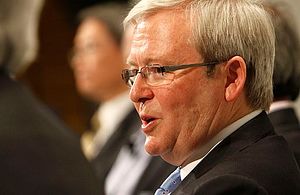Former Australian Prime Minister Kevin Rudd’s bid to be nominated as a candidate for the next United Nations secretary general has been halted by the current Australian government. Rudd required the endorsement of the government in order to proceed with his campaign, and the current prime minister, Malcolm Turnbull, has stated that Rudd is “not well-suited” to the position and will not endorse him for the role.
The prime minister’s decision comes after the cabinet received formal advice from the Department of Foreign Affairs and Trade (DFAT), which recommended that the government endorse Rudd for the role. The advice indicated that Rudd compared well with the current field of 12 candidates for UN secretary general, with a number of former prime ministers and foreign ministers (both positions Rudd has held for the Labor Party) already campaigning for the role.
While Rudd’s nomination for the position was supported by current Foreign Minister Julie Bishop, it is generally acknowledged that the ultra-conservative wing of the Liberal Party opposed the nomination, and due to the current climate within the party, their voices hold sway. This episode demonstrates further that Turnbull and Bishop (who is also deputy leader of the Liberal Party), have an obvious lack of authority within the Liberal Party.
The ultra-conservatives in the Liberal Party despise both the United Nations and the Labor Party, and so the combination of the two would be a source of great anguish to them. Any national gain, both strategic and material, that could be derived from having an Australian as the UN’s chief is easily eclipsed by their ideological fervor.
That Rudd’s bid was also supported by former Liberal Party cabinet ministers Alexander Downer, now Australia’s high commissioner in the United Kingdom, and Joe Hockey, now Australia’s ambassador to the United States, indicates that those with a wider lens, who are able to see beyond partisan politics, saw merit in Rudd’s candidacy.
The decision to not support Rudd has put an end to bipartisan support for prominent Australians campaigning for positions within multilateral institutions. The cabinet of Labor Prime Minister Bob Hawke supported former Liberal Prime Minister Malcolm Fraser for secretary general of the Commonwealth (formerly the British Commonwealth) and the cabinet of the Liberal Party’s John Howard supported former Labor Foreign Minister Gareth Evans to be head of UNESCO.
The public angle that Turnbull has taken in choosing to not endorse Rudd is one implicit in his noted character flaws. In stating that Rudd is “not well-suited for this particular role,” but by failing to elaborate on the specific reasons, he has simply alluded to Rudd’s reputed ego, temper, and style of micromanagement.
Yet Rudd is also a man of some skill and knowledge. As a fluent Mandarin speaker, and former diplomat in Beijing, he has an intimate knowledge of the world’s most populous country, second largest economy, and rising hegemonic power. Currently, he is the chair of the Independent Commission on Multilateralism, a think tank that examines how countries collectively respond to major crises, as well as being president of the Asia Society think tank. As a man of lofty ideas rather than administrative capacity, Rudd would have had difficulty negotiating the UN’s labyrinthine bureaucracy. Due to this, it is commonly believed those who have greater experience working within the structure of the United Nations are more befitting of the role of Secretary-General. This is why New Zealand’s Helen Clark, and Bulgaria’s Irina Bokova, remain the frontrunners for the position.
However, as Australia has never fielded a candidate for UN secretary general, the nomination of Rudd could have been an opportunity for the government to become more familiar with the process for the future, and for the Australian public to become more familiar with the work of the United Nations (to be either supportive or critical of its work).
In the area of foreign affairs, Australia’s two major parties have usually demonstrated a solid bipartisan approach. However, with this incident, this no longer seems the case. Staunch tribalism is now the defining lens with which powerful sections of Australia’s political class approach their roles. This inconsistency will undoubtedly hinder Australia’s ability to project power and influence in the international system.
As the re-elected conservative coalition will require the support of the Labor Party to pass legislation without relying on any far-right or populist parties it is also a very short-sighted tactic to adopt for the forthcoming Parliamentary sittings.
































